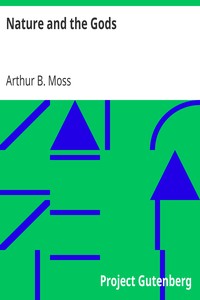| Summary |
"Nature and the Gods" by Arthur B. Moss is a philosophical treatise published in the late 19th century. This book is primarily a collection of lectures that delve into the intricate relationship between humanity, nature, and the concept of deities. It discusses the notion of "Nature" as a foundational element of understanding existence and critically examines the misconceptions surrounding the gods worshipped throughout human history. In "Nature and the Gods," Moss argues that theological beliefs have historically stemmed from humanity's ignorance of natural processes. He suggests that as human beings evolved, they transitioned from primitive worship of natural objects and living beings to more abstract notions of divine beings, ultimately arriving at monotheism. Throughout the text, Moss critiques the role of gods in moral direction and human advancement, insisting that these virtues stem from societal interaction rather than divine influence. He emphasizes that human progress is driven by intelligence, effort, and ethical considerations developed collectively, rather than from divine intervention. The book serves as a call for individuals to rely on reason and education to combat ignorance and suffering in the world, urging humanity to take responsibility for its actions and their effects on nature and society. (This is an automatically generated summary.)
|

